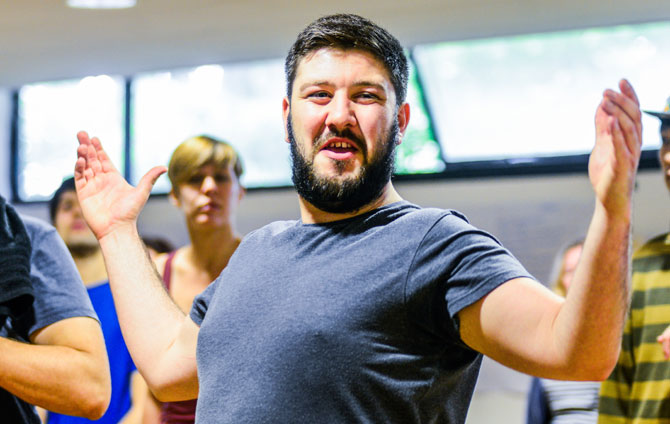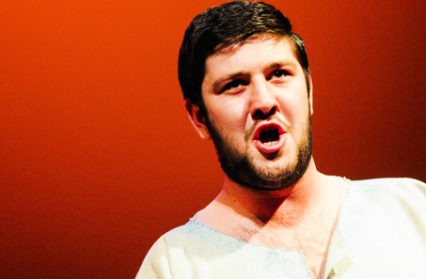Dora Stoutzker Hall, Royal Welsh College of Music and Drama, Cardiff, 21 September 2016
Emyr Wyn Jones, baritone
Nicola Rose, piano
“I didn’t expect this many people, to be honest”, said a clearly-delighted Emyr Wyn Jones to the capacity audience for this lunchtime recital in the Dora Soutzker Hall. The young baritone endeared himself to his listeners with his disarming words, and no less so with his heartfelt and musically-intelligent singing.
Welsh philanthropist Ian Stoutzker has given considerable financial support to the Royal Welsh College of Music and Drama over recent years. The hall in which this recital took place is named after his mother, Dora, who taught piano and singing in Tredegar as a young woman. His eponymous prize has been awarded annually since 2012 to a RWCMD student with outstanding talent and potential. The competition is open to all students of the college, nominated by their teachers. Emyr Wyn Jones won the Ian Stoutzker prize in June this year, his second time in the final.
That Emyr Wyn Jones was a popular and musically-respected student during his time at the college (he was an undergraduate there and has this summer completed an MA in Opera Performance) was demonstrated by the size of his audience for his prize recital. I didn’t expect so many people either, song recitals being notoriously poorly attended these days. It was also gratifying to see that the front five rows were occupied mainly by young people.

Having seen this young singer perform several times in opera as a student I was particularly interested to hear him in recital. The stage-struck undergraduate who I talked to in 2013, when he was performing in WNO Youth Opera’s Paul Bunyan, is now an assured young professional singer. He opened his programme with the first two songs from Vaughan Williams’ Songs of Travel – ‘The Vagabond’ and ‘Let Beauty Awake’. These were good choices, well-known and well-loved by singer and audience alike. If Emyr Wyn Jones was momentarily knocked off balance by being confronted by a much larger audience than he expected, he quickly recovered, and from the start demonstrated not only a beautiful vocal line but also impeccable diction and great feeling for the words of the songs. In my experience, if a singer sees the scene in his or her mind it communicates to the listeners, and this singer is a good communicator.
It is, however, helpful to the audience if a singer says something about songs which are in a foreign language. While many in this audience may have understood Welsh, not all of us do, and we would for example have got more from Meirion Williams’ ‘Aros Mae’r Mynddau Mawr’ if Emyr Wyn Jones had told us something of what it was about. All we knew was that it was in the section of his programme concerned with nature and that it was “one of the most robust Welsh songs for the low voice.” But this is, on his own admission, a singer new to selecting his own repertoire for a recital programme, something he said he had found daunting, so we can forgive him.
On the plus side this young man’s honest and engaging repartee made his audience all the more receptive to his singing. He told us that he had chosen songs of war and loss to continue this recital programme not only because he had studied these in college projects, but also because he had sung as a soloist with the Hallé Orchestra in a concert commemorating the Battle of the Somme and had found this a humbling experience. George Butterworth’s ‘The Lads in their Hundreds’ to A E Housman’s words tells the story of all those young men who went off to war and did not return. The poignant last line: “The lads that will die in their glory and never be old” was delivered with sincere intensity by Emyr Wyn Jones, though I would like to hear him sing this song again in, say, five or ten years, when he is more experienced and will, perhaps, give the words more space. At the moment, maybe through a combination of youthful enthusiasm and understandable nerves, he has a tendency to rush a little at the songs.
That said, this programme of English and Welsh songs was one with which Emyr Wyn Jones was comfortable, and one that felt completely appropriate for the occasion. He rightly said of his pianist, Nicola Rose: “She’s good, isn’t she?” She showed herself to be not only a very good player but also an excellent accompanist and it was a pity that she did not get even a short biography in the programme.
Emyr Wyn Jones completed his published programme in light-hearted vein with the First World War song ‘Roses of Picardy’ and Peter Warlock’s barnstormer, ‘Captain Stratton’s Fancy’, then delighted his audience by returning with ‘Some Enchanted Evening’ from South Pacific. His tender singing of this last song brought a tear to my eye.
We will hear more of Emyr Wyn Jones, this I guarantee, and not just in Wales. This Autumn he goes off to join Independent Opera at Sadler’s Wells. I hope he will not confine himself to opera – the recital platform needs young singers like this who can deliver songs with character and sensitivity, and who can demonstrate that pianissimo singing is, often, the most affecting of all.
Header photo: Emyr Wyn Jones in Britten’s The Rape of Lucretia at RWCMD. Image credit Kirsten McTernan



 Enjoyed this article? Support our writers directly by buying them a coffee and clicking this link.
Enjoyed this article? Support our writers directly by buying them a coffee and clicking this link.







